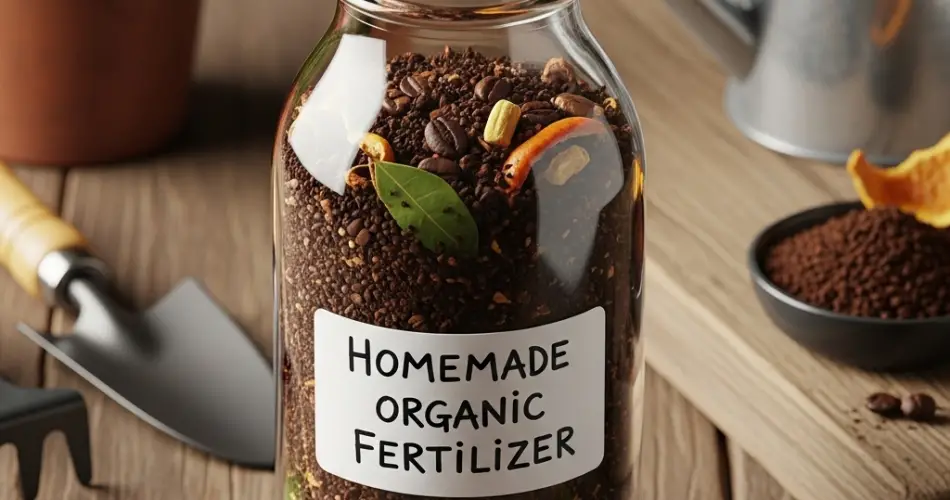One of the most frustrating problems gardeners face is seeing their plants wilt. Wilting not only makes plants look unhealthy but also threatens their growth and survival. The good news is that with the right care and natural feeding methods, you can keep your plants vibrant, strong, and thriving all year round.
This article will guide you through a homemade organic fertilizer recipe and eco-friendly fertilizing practices that will help your plants stay healthy, hydrated, and free from wilting. Say goodbye to drooping leaves and weak growth by applying these natural solutions to your indoor and outdoor plants.
Understanding Why Plants Wilt
Before diving into the solution, it’s important to understand why plants wilt. Wilting generally occurs when a plant’s water intake does not meet its water loss through transpiration and evaporation. Some common causes include:
-
Underwatering: The plant doesn’t receive enough water to maintain turgor pressure in its cells.
-
Overwatering: Excess water causes root rot, damaging the roots’ ability to absorb water.
-
Nutrient Deficiency: Lack of essential nutrients weakens the plant’s overall health.
-
Pest or Disease: Damage from pests or disease can disrupt water flow.
-
Environmental Stress: Excessive heat, poor soil, or improper light conditions.
Proper watering practices are essential, but supplementing your plants with an organic fertilizer can greatly enhance their resilience and vitality.
Benefits of Organic Fertilizers
Organic fertilizers nourish plants naturally by improving soil structure, enhancing microbial activity, and providing essential nutrients gradually. Unlike chemical fertilizers, organic options:
-
Are environmentally friendly and safe for pets and humans.
-
Improve soil fertility over time.
-
Encourage stronger root systems.
-
Reduce the risk of chemical burn to plants.
-
Support sustainable gardening.
Homemade Organic Fertilizer Recipe
Here is a simple and effective homemade organic fertilizer that you can prepare using common household ingredients:
Ingredients:
-
2 cups of used coffee grounds
-
1 cup of crushed eggshells
-
1 cup of banana peel pieces
-
1 tablespoon of molasses (optional)
-
Water (about 2 liters)
Instructions:
-
In a large container, mix the used coffee grounds, crushed eggshells, and banana peels.
-
Add the molasses if available, which provides additional nutrients and helps beneficial microbes thrive.
-
Pour water over the mixture and stir well.
-
Let the mixture sit for 2-3 days, stirring daily.
-
Strain the liquid fertilizer into a watering can or spray bottle for use.
-
The leftover solid material can be composted or added to your garden soil directly.
How to Apply the Homemade Fertilizer
-
For potted plants: Water the soil lightly with the fertilizer solution once every two weeks during the growing season.
-
For garden plants: Apply the solution around the base of plants, avoiding direct contact with leaves to prevent burning.
-
For seedlings: Use a diluted version (half the strength) to avoid overwhelming young roots.
This natural fertilizer supplies nitrogen, calcium, potassium, and trace minerals vital for plant health, helping them resist wilting and grow stronger.
Additional Tips to Prevent Wilting
-
Water Properly: Water deeply but infrequently to encourage roots to grow deeper. Early morning or late evening watering reduces evaporation loss.
-
Improve Soil Drainage: Ensure pots and garden beds drain well to avoid waterlogged roots.
-
Mulch: Use organic mulch like straw or shredded leaves to retain soil moisture and regulate temperature.
-
Choose the Right Plant for Your Environment: Some plants tolerate heat and drought better than others.
-
Control Pests and Diseases: Regularly inspect plants for any signs of trouble and treat promptly with organic methods if possible.
-
Provide Adequate Light: Too much or too little light stresses plants and can cause wilting.
Eco-Friendly Fertilizing Practices
In addition to homemade fertilizers, adopting eco-friendly practices can boost your plants’ health sustainably:
-
Use compost regularly to enrich your soil.
-
Rotate crops and plant companion plants to reduce pest damage.
-
Avoid synthetic chemicals that harm beneficial insects and soil microbes.
-
Collect rainwater to reduce water waste and provide natural watering.
By combining these practices with your homemade fertilizer, your garden will become a thriving ecosystem full of healthy, non-wilting plants.
Signs Your Plants Are Thriving
Healthy, well-fed plants will show:
-
Upright, firm leaves with vibrant colors.
-
New growth and budding flowers or fruits.
-
Strong stems and well-developed roots.
-
Resistance to pests and diseases.
Using homemade organic fertilizers regularly helps maintain these signs of plant health and vitality.
Final Thoughts
Wilting plants don’t have to be a gardener’s norm. With simple natural remedies like homemade organic fertilizers and mindful plant care, you can transform your garden or indoor space into a lush, flourishing environment.
This easy, eco-friendly fertilizer recipe not only nourishes your plants but also supports sustainable gardening. Start applying it today and watch your plants grow stronger, healthier, and never wilt again!



